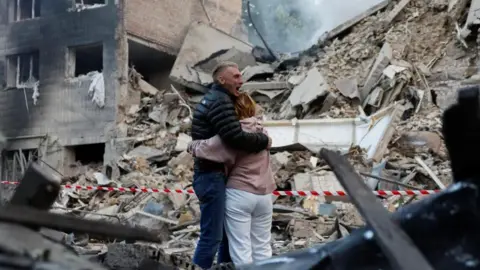In a devastating series of airstrikes, Russian forces targeted the Ukrainian capital, Kyiv, resulting in at least 14 fatalities and leaving dozens injured. The attacks unfolded in the overnight hours and are deemed one of the most significant bombardments of the city since Russia’s full-scale invasion commenced over three years ago. Ukrainian officials reported that the offensive included the launch of 440 drones and 32 missiles, marking a high point in the ongoing conflict between the two nations.
According to Ihor Klymenko, Ukraine’s interior minister, these airstrikes were characterized by their intensity and coordinated effort, emphasizing that Moscow’s defense ministry also reported intercepting and destroying 147 Ukrainian drones during the same period. The strikes on Kyiv unfolded over more than nine hours, causing widespread panic among residents who sought refuge in underground shelters from just before midnight until well after dawn.
Significantly, a ballistic missile struck a nine-story apartment building in one of the city’s districts, contributing to the destruction across a total of 27 districts within Kyiv. This particular incident prompted a strong emotional response from Ukrainian Member of Parliament Lesia Vasylenko, who described the horrifying scene of “people trapped under rubble” and total destruction on a social media platform, X (formerly Twitter). As rescue teams rushed to the scene, they continued to face challenging conditions due to loud explosions and the ongoing need for air defense measures against further drone threats.
Emergency operations were further complicated by the persistence of sirens alerting residents to potential dangers, which disrupted the search for survivors among the debris. Russia’s tactics have intensified in recent weeks, including sending mass waves of drones meant to overwhelm Ukraine’s air defenses, highlighting the escalating nature of hostilities in the region.
Ukrainian President Volodymyr Zelensky condemned the strikes, labeling them as “pure terrorism,” and lamented the inaction of global leaders in confronting these acts of violence. He pointed to Russian President Vladimir Putin’s ability to continue the offensive as representative of the cruelty of war, stating that it is “normal, peaceful people” who suffer while “terrorists” escape the brunt of conflict.
Additional drone strikes hit the southern city of Odesa, causing further casualties with one deceased and at least ten individuals injured. The impact of these assaults resonates beyond immediate damage, as Zelensky had hoped to engage in discussions with U.S. President Donald Trump during the G7 summit. However, given the intensifying crisis, Trump cut short his participation, which represents a setback for Ukraine as it seeks to bolster strategic and military support from the United States and other allies amidst the conflict.
As the situation continues to unfold, the gravity of the strikes on Kyiv underscores not only the immediate human toll incurred but also the broader geopolitical intricacies at play. The war in Ukraine, particularly since the full-scale invasion began, has seen dramatic shifts in military strategies and corresponding international responses, and these latest escalations further deepen the urgency for diplomatic dialogue and conflict resolution amidst a backdrop of escalating violence.
With the conflict intensifying, the international community watches closely, as the implications of these strikes ripple through both regional stability and global relations. As the humanitarian situation develops, the focus remains on the safety and security of those affected by these ongoing military operations.



